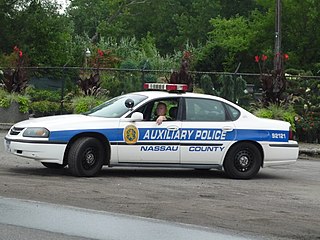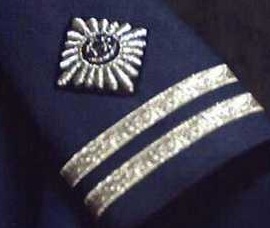
A non-commissioned officer (NCO) is a military officer who does not hold a commission. Non-commissioned officers usually earn their position of authority by promotion through the enlisted ranks. In contrast, commissioned officers usually enter directly from a military academy, officer training corps (OTC) or reserve officer training corps (ROTC), or officer candidate school (OCS) or officer training school (OTS), after receiving a post-secondary degree.
Sergeant is a rank in use by the armed forces of many countries. It is also a police rank in some police services. The alternative spelling, serjeant, is used in The Rifles and other units that draw their heritage from the British light infantry. Its origin is the Latin serviens, 'one who serves', through the Old French term serjant.
Staff sergeant is a rank of non-commissioned officer used in the armed forces of many countries. It is also a police rank in some police services.

A drill instructor is a non-commissioned officer in the armed forces, fire department, or police forces with specific duties that vary by country. Foot drill, military step, and marching are typically taught by drill instructors.
A cadet is a student or trainee within various organisations, primarily in military contexts where individuals undergo training to become commissioned officers. However, several civilian organisations, including civil aviation groups, maritime organisations, and police services, also designate their trainees as cadets.
Officer cadet is a rank held by military cadets during their training to become commissioned officers. In the United Kingdom, the rank is also used by members of University Royal Naval Units, University Officer Training Corps and University Air Squadron; however, these are not trainee officers with many not choosing a career in the armed forces.

Auxiliary police, also called volunteer police, reserve police, assistant police, civil guards, or special police, are usually the part-time reserves of a regular police force. They may be unpaid volunteers or paid members of the police service with which they are affiliated; There is no consistent international definition.
Assistant superintendent, or assistant superintendent of police (ASP), is a rank that was used by police forces in the British Empire and is still used in many police forces in the Commonwealth. It was usually the lowest rank that could be held by a European officer, most of whom joined the police at this rank. In the 20th century, it was in many territories opened to non-Europeans as well.

Police Undergraduate Voluntary Corps is an undergraduate police volunteer organisation in Malaysia. They are undergoing periodic training times to times in 3 years in their respective university and will be commissioned as Police Volunteer Reserve Corp (Malaysia) Inspector by the Inspector General of Police in the end of the 3 years training.

Cadet Inspectors (CIs) are ex-cadets who have completed their secondary school education and volunteered to continue their service in the National Police Cadet Corps in Singapore. They play a similar role to that of warrant officers in the military, not being a cadet nor officer, but in between, possessing a high level of hard and soft skills that can assist in training in their unit.

The Young Marines is a youth program in the United States and Japan open to all youth between the ages of 8 and 18 or high school graduation. The Young Marines program is the leader in youth Drug Demand Reduction (DDR) education and has received many accolades for its DDR programs. It has been awarded the United States Department Of Defense's Fulcrum Shield Award 12 times, with the last one awarded in 2022. The program has partnered up with National Family Partnership to help keep kids off drugs. The Young Marines take part in Red Ribbon Week and hold activities and events that take place during that week in October to push drug prevention and resistance efforts nationally. A documentary released in 2019, but filmed much earlier The Recruits, has brought the Young Marines under renewed scrutiny

The Royal Malaysia Police, is a (primarily) uniformed national and federal police force in Malaysia. The force is a centralised organisation, and its headquarters are located at Bukit Aman, Kuala Lumpur. The police force is led by an Inspector-General of Police (IGP) who, as of 23 June 2023, is Razarudin Husain. Since 10 May 2024, the Yang di-Pertuan Agong is also the Honorary Commissioner-in-Chief of the police force.
The General Operations Force is the light infantry arm of the Royal Malaysia Police. The General Operations Force was established in 1948 during the Malayan Emergency by the British Administration when Malaya was a colony. The police service was mobilised to the field role, primarily to engaging Communist guerrillas during the emerging Insurgency. When Malaysia was formed in 1963, this law enforcement unit was then known as the Police Field Force. The title was adopted when it dropped the previous handle widely referred to as the Jungle Squad.
The Royal Malaysia Police Volunteer Reserve (RMPVR) (Malay: Sukarelawan Simpanan Polis) is a team of special police as well as the supporting element to the full-time Royal Malaysian Police force where normal citizens could volunteer to help to maintain peace and security of their respective formation. The RMPVR officers is mainly composed of professionals such as the architects, engineers, lawyers, teachers, doctors, businessmen and senior government officers. Under the National Blue Ocean Strategies, in 2017, government drive to recruit RMPVR officers is targeted to have 50,000 people from all walks of like. Currently, there are 6,975 PVR officers in Malaysia as of 31 December, 2022.
The New Year Honours 1989 were appointments by most of the Commonwealth realms of Queen Elizabeth II to various orders and honours to reward and highlight good works by citizens of those countries, and honorary ones to citizens of other countries. They were announced on 31 December 1988 to celebrate the year passed and mark the beginning of 1989 in the United Kingdom, Australia, New Zealand, Mauritius, the Bahamas, Grenada, Papua New Guinea, the Solomon Islands, Saint Vincent and The Grenadines, Belize, Antigua and Barbuda, and Saint Christopher and Nevis.
Queen's Birthday Honours are announced on or around the date of the Queen's Official Birthday in Australia, Canada, New Zealand and the United Kingdom. The dates vary, both from year to year and from country to country. All are published in supplements to the London Gazette and many are conferred by the monarch some time after the date of the announcement, particularly for those service people on active duty.
The 1969 Queen's Birthday Honours were appointments to orders and decorations of the Commonwealth realms to reward and highlight citizens' good works, on the occasion of the official birthday of Queen Elizabeth II. They were announced in supplements to the London Gazette of 6 June 1969.
The Royal Brunei Police Cadet Corps is a youth movement in Brunei Darussalam. The membership requires students or teachers from a secondary public or private schools from Brunei Darussalam, or a volunteer with status as a permanent residents or Bruneian nationality.

The Special Actions Unit, commonly known as and abbreviated to UTK, is a tactical unit of the Royal Malaysia Police (RMP). The unit is headquartered at the RMP buildings in Bukit Aman, Kuala Lumpur. Together with the 69 Commando, they form the Pasukan Gerakan Khas.
The police in Canada's ranks differ according to the different police forces and depend on different laws at the federal, provincial, and municipal levels.









